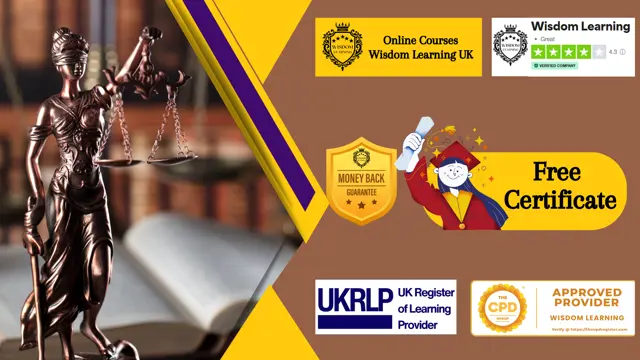
Complete CILEx Course
UKRLP & CPD approved provider | New Course | Easy Refund | Free e-Certificate | Instant Access | Tutor Support |
Wisdom Learning Limited
Summary
- Reed Courses Certificate of Completion - Free
- Tutor is available to students
Add to basket or enquire
Overview
CILEx
The CILEx course is a comprehensive legal education course designed to equip individuals with the knowledge and skills needed for a successful career in law. This CILEx course covering a diverse range of legal topics, including company law, contract law, criminal law, and more, this CILEx course provides a thorough understanding of UK legal principles and procedures. Students will learn to apply legal concepts to real-world scenarios, conduct legal research, draft documents, and advocate effectively. With flexible learning options and a focus on professional ethics and responsibilities, the CILEx course offers a pathway to career advancement within the legal profession in the UK.
Key Features- CILEx
This CILEx includes the following offers:
- CILEx - Instant Free Certificates
- Self-paced learning
- 24/7 Support
Enrol on our CILEx course to gain a comprehensive understanding of CILEx.
Certificates
Reed Courses Certificate of Completion
Digital certificate - Included
Will be downloadable when all lectures have been completed.
Curriculum
-
Unit 1: Company and Partnership Law 19:00
-
Unit 2: Contract Law 19:00
-
Unit 3: Criminal Law 19:00
-
Unit 4: Land Law 16:00
-
Unit 5: Employment Law 17:00
-
Unit 6: Civil Litigation 20:00
-
Unit 7: Family Law 18:00
-
Unit 8: Probate Practice 20:00
-
Unit 9: Law of Tort 16:00
-
Unit 10: Employment Practice 07:00
-
Unit 11: Conveyancing 10:00
-
Unit 12: Criminal Litigation 10:00
-
Unit 13: Law of Evidence 16:00
-
Unit 14: Equity and Trusts 09:00
-
Quiz 10:00
Course media
Description
CILEx Curriculum
Unit 1: Company and Partnership Law
Company Formation and Structure
- Types of companies
- Incorporation process
- Company constitution
- Legal personality
Corporate Governance
- Roles and responsibilities of directors
- Shareholders' rights and responsibilities
Corporate Finance
- Share capital
- Debt financing
- Dividends and profit distribution
Corporate Insolvency
- Insolvency procedures
- Liquidation and administration
- Directors' duties in insolvency
Partnership Law
- Formation and types of partnerships
- Partnership agreements
- Rights and duties of partners
- Dissolution of partnerships
Unit 2: Contract Law
Formation of Contracts
- Offer and acceptance
- Consideration
- Intention to create legal relations
Contractual Terms
- Express and implied terms
- Conditions, warranties, and innominate terms
- Exclusion clauses
Vitiating Factors
- Misrepresentation
- Duress and undue influence
- Mistake
Discharge of Contracts
- Performance
- Agreement
- Frustration
- Breach
Remedies for Breach of Contract
- Damages
- Specific performance
- Injunctions
- Rescission
Unit 3: Criminal Law
General Principles of Criminal Liability
- Actus reus and mens rea
- Strict liability offenses
- Causation
Offenses Against the Person
- Assault and battery
- Actual bodily harm (ABH) and grievous bodily harm (GBH)
- Sexual offenses
Offenses Against Property
- Theft
- Burglary
- Fraud
Defenses
- Self-defense
- Insanity
- Automatism
- Intoxication
Sentencing and Punishment
- Types of sentences
- Factors influencing sentencing
- Young offenders
Unit 4: Land Law
Interests in Land
- Freehold and leasehold estates
- Easements and profits
- Covenants
Registration of Land
- The land registration system
- First registration
- Registration of dealings
Co-Ownership
- Joint tenancy and tenancy in common
- Rights and obligations of co-owners
- Severance of joint tenancy
Leases
- Creation and termination of leases
- Rights and duties of landlords and tenants
- Remedies for breach of lease
Mortgages
- Creation and nature of mortgages
- Rights of mortgagors and mortgagees
- Remedies for default
Unit 5: Employment Law
Employment Contracts
- Formation and terms
- Implied terms
- Variation of contracts
Rights at Work
- Discrimination and equality
- Health and safety
- Working time regulations
Termination of Employment
- Dismissal (fair and unfair)
- Redundancy
- Constructive dismissal
Employee Representation
- Trade unions
- Collective bargaining
- Industrial action
Employment Tribunals
- Procedure and jurisdiction
- Remedies
- Appeals
Unit 6: Civil Litigation
Pre-Action Considerations
- Alternative dispute resolution (ADR)
- Pre-action protocols
- Limitation periods
Commencement of Proceedings
- Issuing a claim
- Service of documents
- Pleadings
Interim Applications and Case Management
- Interim remedies
- Case management conferences
- Directions
Trial Process
- Evidence
- Examination of witnesses
- Judgment
Enforcement of Judgments
- Methods of enforcement
- Insolvency proceedings
- Contempt of court
Unit 7: Family Law
Marriage and Civil Partnerships
- Formation and dissolution
- Legal consequences
Children
- Parental responsibility
- Child arrangements orders
- Adoption and surrogacy
Domestic Violence
- Protection orders
- Legal remedies
Financial Orders
- Maintenance
- Division of assets
- Pre-nuptial agreements
Cohabitation
- Legal status
- Rights and obligations
Unit 8: Probate Practice
Wills
- Validity and revocation
- Construction and interpretation
Intestacy
- Rules of intestacy
- Distribution of estates
Grants of Representation
- Probate and administration
- Applying for grants
Estate Administration
- Duties of personal representatives
- Collecting and distributing assets
- Taxation issues
Contentious Probate
- Will disputes
- Claims under the Inheritance Act
- Resolving disputes
Unit 9: Law of Tort
Negligence
- Duty of care
- Breach and causation
- Defenses
Occupiers' Liability
- Occupiers' Liability Act 1957 and 1984
- Duties to lawful visitors and trespassers
Nuisance and Rylands v Fletcher
- Private and public nuisance
- Rule in Rylands v Fletcher
Defamation
- Libel and slander
- Defenses
Remedies in Tort
- Damages
- Injunctions
- Compensation orders
Unit 10: Employment Practice
Employment Tribunal Process
- Preparing for tribunal hearings
- Representation
Dispute Resolution
- Mediation and conciliation
- Negotiating settlements
Unit 11: Conveyancing
Residential Property Transactions
- Sale and purchase process
- Mortgages
Commercial Property Transactions
- Lease negotiations
- Business tenancies
Regulatory Compliance
- Land Registry requirements
- Money laundering regulations
Unit 12: Criminal Litigation
Criminal Procedure
- Pre-trial process
- Trial preparation
Advocacy Skills
- Representing clients in court
- Examination and cross-examination techniques
Sentencing Advocacy
- Mitigation
- Sentencing guidelines
Unit 13: Law of Evidence
Relevance and Admissibility
- Types of evidence
- Rules of admissibility
- Hearsay and opinion evidence
Witnesses
- Competence and compellability
- Examination and cross-examination
- Expert witnesses
Privilege
- Legal professional privilege
- Public interest immunity
- Spousal privilege
Character Evidence
- Propensity evidence
- Bad character evidence
- Similar fact evidence
Burden and Standard of Proof
- Civil and criminal standards
- Shifting burdens
Unit 14: Equity and Trusts
Equitable Remedies
- Specific performance
- Injunctions
- Rectification and rescission
Trusts
- Creation and types of trusts
- Trustees' duties and powers
- Beneficiaries' rights
Equitable Principles
- Doctrine of notice
- Fiduciary relationships
- Estoppel
- Career Advancement
- Professional Recognition
- Specialisation
- Practical Skills
- Ethical Understanding
- Networking Opportunities
- Comprehensive Coverage
- Flexibility offers
- Regulatory Compliance
- Problem-Solving Abilities
CILEx Certificate
Upon completing the CILEx Course, you will receive an instant CILEx certificate from Reed.
Who is this course for?
This CILEx course is ideal for:
- Aspiring Legal Professionals
- Law Students and Graduates
- Career Changers
- Legal Practitioners
- Business Professionals
- Public Sector Employees
Requirements
CILEx
- Learners with no prior CILEx knowledge may enrol in this CILEx course.
- This CILEx course has no requirements.
Career path
CILEx
CILEX training offers a unique opportunity to gain valuable skills and advance your career
Questions and answers
Currently there are no Q&As for this course. Be the first to ask a question.
Reviews
Currently there are no reviews for this course. Be the first to leave a review.
Legal information
This course is advertised on reed.co.uk by the Course Provider, whose terms and conditions apply. Purchases are made directly from the Course Provider, and as such, content and materials are supplied by the Course Provider directly. Reed is acting as agent and not reseller in relation to this course. Reed's only responsibility is to facilitate your payment for the course. It is your responsibility to review and agree to the Course Provider's terms and conditions and satisfy yourself as to the suitability of the course you intend to purchase. Reed will not have any responsibility for the content of the course and/or associated materials.


